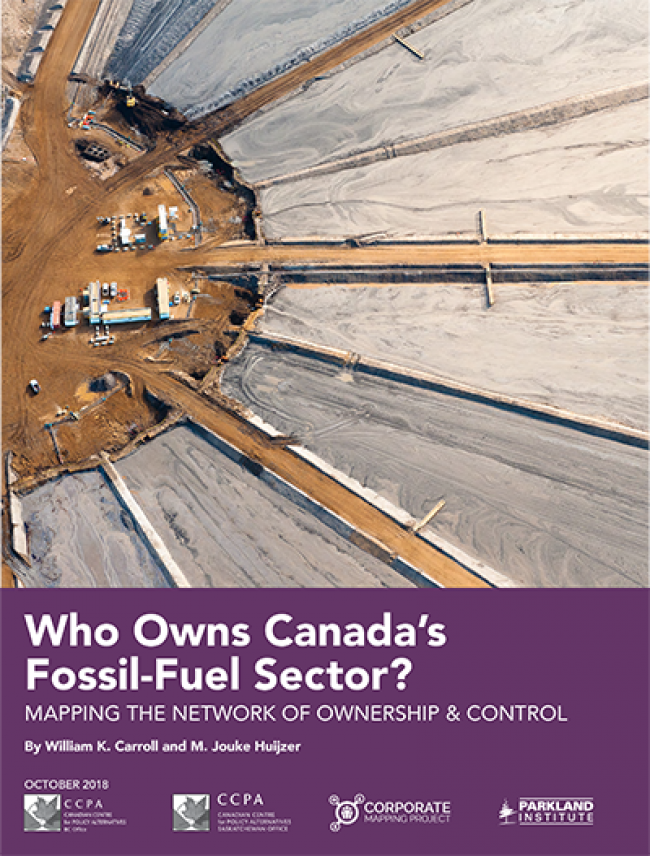Articles Menu

Oct 18, 2018 - Highly concentrated corporate ownership of Canada's energy sector and lack of government influence mean there's very little incentive for the fossil fuel industry to pay attention to the dangers of global climate change or worry about the communities and workers that depend on it.
That's the tough message behind a new study -- Who Owns Canada's Fossil Fuel Sector? Mapping the network of ownership and control -- released this morning by the Corporate Mapping Project, a six-year research initiative jointly run by the University of Victoria, the B.C. and Saskatchewan branches of the Canadian Centre for Policy Alternatives, and the University of Alberta's Parkland Institute.
Major investors in the Canadian fossil fuel industry have sunk so much money in fossil fuel extraction their natural inclination is to ensure business continues as usual as long as possible, instead of addressing the serious climate issues facing the planet or offer any confidence decisions made in the Canadian oilpatch will be made in the public interest, the study reveals.
"Ownership is too centralized," said University of Victoria sociology professor Dr. Bill Carroll, co-author of the study and a director of the Corporate Mapping Project, in an interview. Industry decision makers, he said, "are really leaning toward maximization of their long-term investments. They want to get the full value out of their major corporate investments."
That explains why there has been so much corporate pressure to complete the now-public-owned Trans Mountain Pipeline Expansion Project and build other pipelines, he said, despite questionable economic cases for the investment.
That's understandable from the industry's perspective, Carroll added, but it is an incentive to continue expanding their operations and continuing their emphasis on fossil fuels as long as possible regardless of the damage to the planet's environment.
In the Corporate Mapping Project news release published this morning, Carroll summarized the study's findings as showing "substantial ownership and strategic control of Canada's fossil fuel industries are in the hands of a few major players, including all the Canadian big banks and several U.S. investment funds, governments, and some wealthy families."
Many of those investors, the study also shows, are located outside Canada. "These entities have both an interest in the sector's continued growth and the economic power to shape its future," he said in the news release.
This reality is relevant to both the response to climate change and the question of democracy in Canada, where so much power is concentrated in one area, argued Carroll, who worked on the study with Jouke Huijzer of Vrije University in Brussels.
The study analyzed shareholder and revenue data from recent years to map the true ownership picture of the Canadian energy industry. The researchers found that the top 25 owners accounted for more than 40 per cent of total Canadian fossil fuel industry revenues from 2010 to 2015, the news release said. The top two investors were Exxon Mobil Corp. and the Royal Bank of Canada, the study found.
Among the other findings summarized in the report:
The study also highlights the significance of interlocking directorships in controlling the industry, placing groups of investors in a position to exert control as a "constellation of interests."
The study also found that increasing Canadian control of the country's energy sector has made little difference to the way the industry functions, including its reluctance to invest in sustainable alternatives to fossil fuels.
Obviously, whether the owners are Canadians or foreigners, it's a risky strategy to count on a small group of private investors whose interests do not align with those of the pubic to make the right investments regarding transition from fossil fuel-based energy generation to renewable resources.
That makes it extremely difficult to plan for the energy future in a rational way. As Carroll observed, "we can't sunset the industry and ramp up renewables under this structure."
Formally known as Mapping the Power of the Carbon-Extractive Corporate Resource Sector, the Corporate Mapping Project is financed by a $2.5-million partnership grant awarded by the Social Sciences and Humanities Research Council of Canada, plus $2 million in matching funds from partner organizations. SSHRC Partnership Grants support formal partnerships between universities and others to improve understanding of critical issues facing Canadians.
This post also appears on David Climenhaga's blog, AlbertaPolitics.ca.
Download the full study.